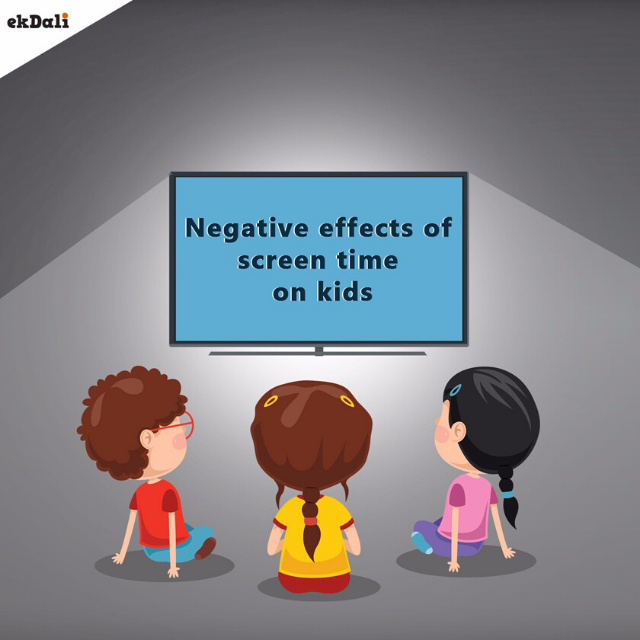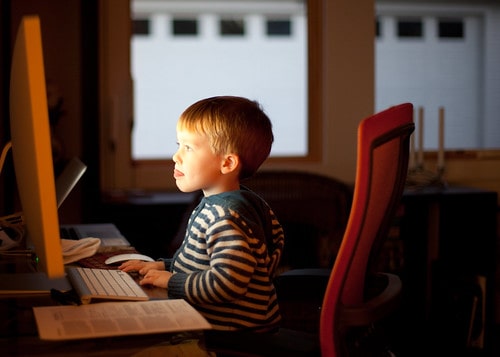In today’s digital world, understanding the negative effects of screen time on kids has become more crucial than ever. While screens can provide educational value, excessive screen time can have serious consequences on child development and mental health, impacting everything from focus to emotional well-being.
Studies show that screen time affects the teenage brain and has measurable effects on children’s mental health, raising concerns about how much exposure is too much. In this post.
10 Negative Effects of Screen Time on Kids:
we’ll cover 10 Negative Effects of Screen Time on Kids and explore key statistics on the negative effects of screen time on child development to help parents make informed decisions for a healthier balance.

1. Effects of Excessive Screen Time on Child Development
Too much screen time can slow a child’s cognitive growth, especially when it takes away from other key activities like outdoor play, reading, and direct interaction with family and friends. These are crucial for healthy development and learning, as they help build problem-solving skills and creativity.
2. Effects of Screen Time on Children’s Mental Health
Research links high screen time with poor mental health outcomes, especially in children and teenagers. Spending long hours on screens, especially social media, may lead to increased anxiety, depression, and low self-esteem as kids become more concerned with fitting in or comparing themselves to others.
3. Negative Effects of Screen Time on Child Development: Statistics and Research
Statistics show that screen time use in children has skyrocketed in recent years. According to a recent study by the American Academy of Pediatrics, children between 8-12 years old spend an average of 4-6 hours per day on screens. This time spent on screens can replace activities essential to development, such as reading, physical play, and family time.
4. Effects of Screen Time on the Teenage Brain
For teenagers, the effects of screen time are even more concerning. High screen exposure during the teenage years impacts areas of the brain responsible for emotional regulation and impulse control. Teens who spend too much time on screens may struggle with managing emotions, impulse control, and making sound decisions, which can impact their well-being in the long term.
5. Negative Effects of Screen Time on Child Mental Health
Excessive screen time has also been associated with behavioral issues. Children who spend extended periods on screens tend to show more aggression, irritability, and difficulty with attention. Limiting screen time and replacing it with hands-on, engaging activities can significantly benefit their mental health.
6. Reduced Cognitive Development
When children spend too much time in front of screens, they miss out on activities that help build essential cognitive skills. Reading books, playing with blocks, and engaging in outdoor activities all foster problem-solving abilities, but screen time often replaces these enriching experiences.
7. Sleep Disruption and Physical Health
Screens, especially before bedtime, emit blue light, which interferes with melatonin production, the hormone responsible for sleep. This leads to poor sleep quality, and in turn, affects children’s physical health, mood, and energy levels throughout the day. Physical inactivity associated with screen time also increases the risk of obesity.

8. Shortened Attention Span
Studies show that screen time, especially through fast-paced videos and games, can shorten children’s attention spans. With constant visual stimulation, children may find it difficult to focus on slower-paced tasks, such as reading or completing homework.
9. Impact on Academic Performance
There is a proven link between high screen time and poor academic performance. Kids who spend more time on screens tend to perform worse in school, particularly in subjects like reading and math. Replacing screen time with reading or interactive learning activities can help improve their focus and comprehension.
10. Behavioral and Social Skills Issues
Spending time on devices can reduce children’s face-to-face social interaction, affecting their ability to develop communication and empathy skills. Without engaging in play and communication with peers, children may struggle with teamwork, patience, and sharing.
Tips for Managing Screen Time for Healthy Development:

Here are some practical and effective tips for managing screen time, helping children maintain a healthy balance with technology:
Set Clear Time Limits Based on Age:
- Create daily screen time limits that suit your child’s age. For example, the American Academy of Pediatrics suggests up to 1 hour per day of high-quality screen time for children aged 2-5.
- For older kids, balancing screen time with other important activities like homework, play, and family time is essential.
Encourage Regular Physical Activity:
- Encourage your child to participate in physical activities like sports, outdoor games, or even family walks.
- Physical play boosts their health and provides a valuable break from screens, helping them stay active and engaged.
Create Screen-Free Zones and Times:
- Designate specific areas, such as the dining room or bedrooms, as screen-free zones.
- Setting times, like during meals or an hour before bed, where screens are put away promotes family bonding and supports better sleep habits.
Model Balanced Screen Habits:
- Children often imitate adults, so demonstrate a balanced approach to screens by limiting your own use.
- Show how you enjoy screen-free activities, like reading or cooking, to set an example for a healthier relationship with technology.
Prioritize High-Quality, Educational Content:
- For the screen time they do have, guide children toward age-appropriate, educational content that encourages learning, creativity, or problem-solving.
- Interactive, engaging programs and games are preferable to passive watching.
Promote Social Interaction and Face-to-Face Communication:
- Strengthen your child’s social skills by encouraging in-person interactions through playdates or family activities.
- Face-to-face interactions foster important social skills like empathy and communication, skills screens can’t fully replace.
Explain the Importance of Screen Time Limits:
- Discuss with your child why screen time is limited and how it benefits their health and well-being.
- When children understand the reasons behind the rules, they are often more cooperative and willing to participate in non-screen activities.
Develop a Balanced Daily Routine:
- Create a daily schedule that includes a mix of activities, balancing screen time with physical play, reading, and family time.
- This helps children understand the value of diverse activities, reducing reliance on screens for entertainment.
Encourage Tech-Free Hobbies:
- Support your child’s interest in activities like art, music, sports, or building projects.
- Tech-free hobbies foster creativity, confidence, and hands-on learning, providing enjoyment and achievement outside of screen-based activities.
Use Parental Control Tools for Extra Support:
- Parental control settings can help limit screen time, filter content, and monitor usage effectively.
- These tools provide parents with added control, supporting healthy tech habits while helping keep children safe online.
FAQS:
What are 5 negative effects of screen time?
Excessive screen time can lead to poor sleep, reduced attention span, decreased physical activity, social isolation, and increased risk of anxiety or depression. These effects can impact both mental and physical well-being in children.
Why is screen time bad for your child?
Too much screen time can interfere with healthy brain development, social skills, and sleep patterns. It can also reduce time for active play, learning, and family interaction, all essential for a child’s balanced growth.
How does screen time affect a child’s development?
Screen time can affect cognitive, emotional, and physical development by reducing focus, impairing social skills, and limiting physical activity. It can also delay language development in young children due to reduced face-to-face interaction.
How screen time affects the brain?
High screen exposure can alter brain structure, affecting areas related to focus, memory, and emotional regulation. It can overstimulate the reward system, potentially making it harder for children to engage in non-digital activities.
Conclusion:
In today’s digital age, screens have become an integral part of our lives. Still, the negative effects of screen time on children are becoming more evident, especially in terms of development and mental health. While screens can provide educational and entertainment value, excessive screen time on child development may lead to concerning consequences, from impacting a child’s cognitive growth to affecting emotional well-being.
In this blog, we’ll explore reasons why screen time is bad, discuss the effects of screen time on children’s mental health, and examine how screen usage influences the teenage brain. With real statistics on the negative effects of screen time on child development, we aim to shed light on why managing screen time is essential for healthy growth.
External Resources:
Centers for Disease Control and Prevention (CDC) on Screen Time and Child Health
CDC: Children’s Mental Health and Screen Time
World Health Organization (WHO) Guidelines on Screen Time for Young Children
WHO Guidelines on Physical Activity, Sedentary Behaviour, and Sleep
Mayo Clinic: Screen Time and Its Impact on Children’s Health
Mayo Clinic: How Screen Time Affects Children’s Health

Empowering parents to raise happy, confident kids. Get practical parenting tips and advice on our blog, Smart Parent Guides.
